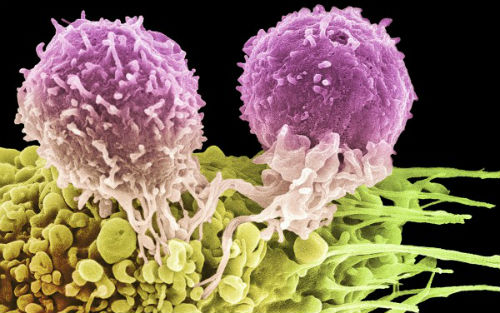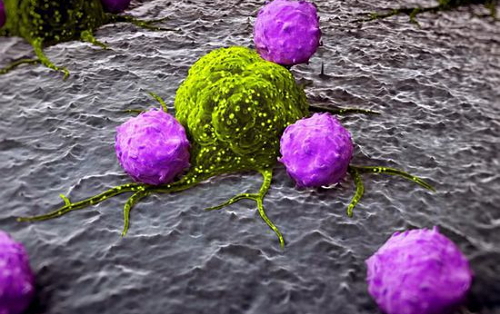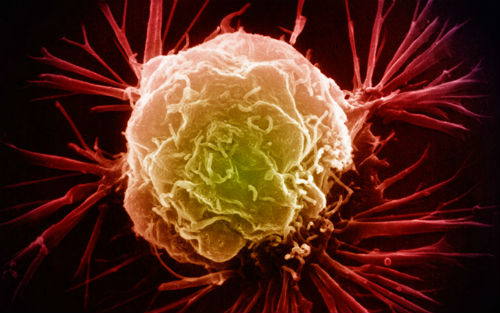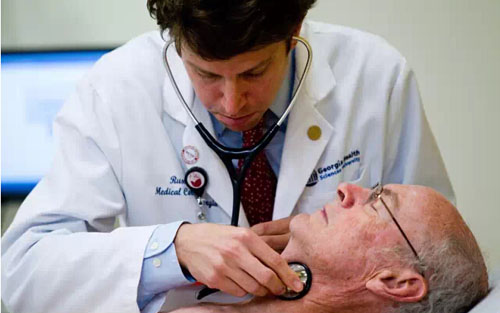Release date: 2015-09-25

According to the World Health Organization's Global Cancer Report 2014, global cancer patients and deaths have increased in 2012. Nearly half of the newly added cancer cases have occurred in Asia, most of which are in China. The first one. According to the report, 4.2 million people die of cancer every year in the world. The top three cancers are lung cancer, liver cancer and stomach cancer.
The "Report" predicts that global cancer cases will show rapid growth, from 14 million in 2012 to 19 million in 2025, and by 2035, it will reach 24 million, which will increase in 20 years. 50%. The report shows that the global burden of cancer is increasing at an alarming rate, with one in every eight deaths dying of cancer.
The severity of the cancer epidemic has led scientists around the world to work on a variety of anti-cancer therapies. Recently, Sun Xuejun blog of Science Network published an article entitled "From the three revolutions of cancer to explore future cancer treatment strategies", summed up three major revolutions in the field of cancer treatment, namely chemotherapy, targeted therapy and immunotherapy.
Nowadays, immunotherapy is more about cell therapy (CAR-T, etc.) and immunological checkpoint inhibition (Anti-CTLA-4, Anti-PD-1/PD-L1, etc.). However, one of yesterday’s news gave another member of the cancer vaccine a “fireâ€. A tumor vaccine is a therapeutic vaccine that uses a vaccine to elicit a specific anti-tumor T cell response to destroy the tumor.
The fastest 1 year, a therapeutic cancer vaccine for multiple diseases will be on the market

According to several media reports, a few days ago, Nobel Prize winner Rudy Marcus, American Chemical Society Sugar Chemistry Branch Horace Bell Award winner Geert-Jan Boons and other heavyweight scientists entered the Chinese Pharmaceutical University to communicate with the drug master students. It was revealed that the fastest one year, the therapeutic cancer vaccine for a variety of diseases will be listed.
According to reports, the current research and development of cancer vaccines is a hot spot in the United States, Europe and other countries. Cervical cancer vaccines have been listed in the United States many years ago, and the prostate cancer vaccine has also been developed and marketed in the United States. It is understood that as early as 2010, the US Food and Drug Administration (FDA) approved Provenge for the treatment of prostate cancer. This preparation is made by extracting immune cells from the patient's own blood, and Provenge needs to inject 3 doses every 2 weeks or so.
Geert-Jan Boons said that both vaccines belong to a single vaccine, that is, we have fully understood the cause of the disease, and the vaccine developed is very effective against the disease virus. But there are still many cancers. At present, humans cannot fully understand the cause of the disease. They only know that its onset is related to the fact that a substance inhibits the normal work of its immune system.
"Scientists have now found such substances and are developing vaccines to remove them." Geert-Jan Boons said that such therapeutic vaccines for a variety of cancers are now in the third phase of the US, the fastest If you don't want to go public in a year.
Then, since the cancer vaccine is so easy to open the "swipe screen mode", let's take a look at some recent related results.
Recent advances in cancer vaccine research

The Lancet (September 17)
On September 17, a study published in The Lancet magazine, scientists used a genetically engineered vaccine to successfully remove the high degree of cervix in nearly half of the women who received the vaccine in clinical trials. Precancerous lesions. Scientists say their goal is to find non-surgical approaches to treat precancerous lesions caused by HPV.
In this study, the scientists used a vaccine originally developed by Dr. David Weiner, a scientist at the University of Pennsylvania, designed to teach the immune system cells to recognize precancerous cells and cancer cells – these cells have two HPV surfaces. Virus strains 16 and 18 infect related proteins. The vaccine, developed by Inovio Pharmaceuticals, is administered intramuscularly.
Nature Communications (August 12)
On August 12th, in a paper published in Nature Communications, Professor David Mooney of Harvard University led a research team to develop a new cancer vaccine. The study used an injectable sponge gel (gelatin) to deliver tumor cells and immune stimulating factors to enhance the body's attack on cancer. This crystal gel vaccine is expected to become a simpler and more economical cancer immunotherapy.
Crystal glue is a type of hydrogel formed by cross-linking of polymer chains, which is similar in many respects to the soft tissue of the body. Mooney et al. obtained a sponge-like porous gelatin capable of bringing living cells, biomolecules or drugs into the human body by adjusting the morphology, physical properties and chemical composition of the gelatin. Such techniques can enable a variety of medical applications including cancer immunotherapy.
“After entering the body, the gelatin can release immune-enhancing factors in a highly controlled manner, recruiting immune cells to the vicinity. These immune cells will contact and read the characteristics of the tumor cells in the gelatin, and then strongly infect the patient's tumor tissue. A powerful attack that undermines immune tolerance in the tumor microenvironment," said Sidi Bencherif, the first author of the article.
The researchers tested the cancer vaccine in an animal model of melanoma. Studies have shown that the delivery of cancer cells and drugs with gelatin can trigger a strong immune response, significantly reducing tumors and even preventing tumor growth. Next, they will try to treat other types of cancer with a gel-based approach.
Science (April 2)

In a paper published in the journal Science on April 2, researchers from the University of Washington School of Medicine reported that early data from a clinical trial showed that some individualized melanoma vaccines could be used to stimulate A strong immune response against unique mutations in the patient's tumor. These tailored vaccines for three advanced melanoma patients appear to increase the number and diversity of anti-cancer T cells in response to tumors.
The notorious melanoma has a large number of genetic mutations caused by exposure to ultraviolet light. Biopsy samples of melanoma usually carry more than 500 mutant genes. Using predictive algorithms, the researchers identified tumor antigens that were not only expressed in patient tumors but also recognized by the patient's immune system as "non-self" substances, thereby narrowing the vaccine candidates they searched for.
The researchers collaborated with the University of Oklahoma Health Science Center's William Hildebrand research team to biochemically verify the expression of tumor antigen peptides on cancer cells, providing important evidence that vaccines can cause the most effective T cells against melanin. tumor. They selected seven unique tumor antigens for each vaccine and used specialized immune cells from patients, dendritic cells, to bring these tumor antigens to the immune system. Dendritic cells play an important role in awakening the immune system and alerting T cells to cancer.
After vaccination, the patient draws blood once a week for approximately 4 months. By analyzing blood samples, the researchers can see that each patient initiated an immune response to a specific tumor antigen in the vaccine. These vaccines have also stimulated a variety of T cell clones ready to fight against tumor antigens, suggesting that this method can be used to activate numerous T cells that target other cancers with high mutation rates, such as lung cancer, bladder cancer, and Mutations in certain colorectal cancers.
Dr. Gerald Linette, a senior author of the paper and a medical oncologist at the University of Washington, said: "Our research team has developed a new strategy to achieve individualized cancer treatment. Many researchers speculate that it is possible to use tumor antigens to broadly activate the human immune system. But until now we are still not sure. We still have a lot of work to do, but this is undoubtedly an important first step, it opens the door for immune-based individualized cancer treatment."
Nature (November 27, 2014)
In a study published in Nature on November 27 last year, scientists at the University of Washington were working on a melanoma in a clinical trial led by Dr. Gerald Linette and Dr. Beatriz Carreno of the Siteman Cancer Center. The patient underwent an individualized cancer vaccine assessment. In addition, researchers are working to use these vaccines to fight breast cancer, brain cancer, lung cancer and head and neck cancer, and other clinical trials are expected to be launched in the next one to two years.
In the above study, scientists tested vaccines at these stages of the study in computer simulations, cell cultures, and animal models. The results show that these vaccines can disrupt the immune system or alleviate a significant number of tumors. For example, the vaccine cures nearly 90% of mice with an advanced muscle cancer.
“We believe that finding ways to identify mutant tumor proteins and using them as specific targets for reactivated T cells to attack tumors is safer,†Schreiber said. “We believe that integrating these proteins into vaccines will only release T cells to attack tumors. So far, our tests have been very successful."
Recent cancer vaccine related companies progress

Australian company's new vaccine is approved for human trials
On May 25, Australian listed company Regeneus announced that it has obtained the permission of the Ethics Committee to conduct the first human clinical trial of cancer vaccine. The vaccine, called RGSH4K, is a combination of the patient's own tumor cells and proprietary immunostimulants that stimulate the patient's immune system and personalize against the tumor. Previously, scientists have tested dogs with different types of cancer and found that the vaccine significantly extended their average life expectancy.
Scientists hope that the next step in human trials will prove that the RGSH4K vaccine can personalize a range of multiple types of primary and secondary tumors and reduce the risk of tumor recurrence. The human trial involved 21 patients with advanced cancer. [detailed]
The first major success of oncolytic immunotherapy: the skin cancer vaccine T-Vec phase III effect is significant
In May, two FDA experts [CTGTAC (Cell, Tissue, and Gene Therapy Expert Committee) and ODAC (Anti-Tumor Expert Committee)] supported Anjin's anti-tumor vaccine Talimogene laherparepvec (T-Vec) 22:1. ) for advanced melanoma treatment.
Soon after, researchers from the British Cancer Institute, the Royal Marsden NHS Foundation, and 64 research centers around the world, including Oxford University, led the anti-tumor vaccine Talimogene laherparepvec (T-Vec) for advanced melanoma treatment III. Clinical trials, the results of the experiment clearly show that cancer patients benefit.
This landmark clinical trial confirmed that a genetically engineered herpesvirus can kill cancer cells, stimulate the immune system to fight cancer, and inhibit the development of skin cancer; this is also the first time in the world, a III Phase-of-virus immunotherapy trials have clearly shown that cancer patients benefit.
Source: Bio-Exploration
Spices,Coriander Seeds,Cumin Powder,Garlic Powder
ZHONGSHAN G.H.L. TRADING CO., LTD. , https://www.ghltrade.com